Matthew McKay, Ph.D., is a professor at the Wright Institute in Berkeley, CA. He is coauthor of The Relaxation and Stress Reduction Workbook, Thoughts and Feelings,Messages, Self-Esteem, and others. His books combined have sold more than 2 million copies. He received his Ph.D. in clinical psychology from the California School of Professional Psychology. In private practice, he specializes in the cognitive behavioral treatment of anxiety, anger, and depression.
Jeffrey C. Wood, Psy.D., lives and works in the San Francisco Bay Area. He specializes in cognitive behavioral treatments for depression, anxiety, and trauma, as well as assertiveness and life-skills coaching. He can be reached at www.drjeffreywood.com. He is author of Getting Help.
Jeffrey Brantley, MD, is a consulting associate in the Duke Department of Psychiatry and the founder and director of the Mindfulness-Based Stress Reduction Program at Duke Universitys Center for Integrative Medicine. He has represented the Duke MBSR program in numerous radio, television and print interviews. He is the best-selling author of Calming Your Anxious Mind and coauthor of Five Good Minutes: 100 Morning Practices to Help You Stay Calm and Focused All Day Long.
Find more help online at cbt-self-help-therapy.com. CBT Self-Help Therapy offers web-based treatment for stress based on the book The Relaxation & Stress Reduction Workbook. This interactive program can be used by clients working on their own, or their therapists can monitor their work on the secure server. Other modules in CBT Self-Help Therapy offer treatment for anxiety, depression, anger, and emotion dysregulation.
Chapter 1
Basic Distress Tolerance Skills
Distress Tolerance Skills: What Are They?
At some point in our lives, we all have to cope with distress and pain. Either it can be physical, like a bee sting or a broken arm, or it can be emotional, like sadness or anger. In both cases, the pain is often unavoidable and unpredictable. You cant always anticipate when the bee will sting you or when something will make you sad. Often, the best you can do is to use the coping skills that you have and hope that they work.
But for some people, emotional and physical pain feels more intense and occurs more frequently than it does for other people. Their distress comes on more quickly and feels like an overwhelming tidal wave. Often, these situations feel like theyll never end, and the people experiencing them dont know how to cope with the severity of their pain. For the purposes of this book, well call this problem overwhelming emotions. (But remember, emotional and physical pain often occur together.)
People struggling with overwhelming emotions often deal with their pain in very unhealthy, very unsuccessful ways because they dont know what else to do. This is understandable. When a person is in emotional pain, its hard to be rational and to think of a good solution. Nevertheless, many of the coping strategies used by people with overwhelming emotions only serve to make their problems worse.
Heres a list of some common coping strategies used by people dealing with this problem. Check ( ) the ones that you use to cope with your stressful situations:
) the ones that you use to cope with your stressful situations:
- ___ You spend a great deal of time thinking about past pains, mistakes, and problems.
- ___ You get anxious worrying about possible future pains, mistakes, and problems.
- ___ You isolate yourself from other people to avoid distressing situations.
- ___ You make yourself feel numb with alcohol or drugs.
- ___ You take your feelings out on other people by getting excessively angry at them or trying to control them.
- ___ You engage in dangerous behaviors, such as cutting, hitting, picking at, or burning yourself or pulling out your own hair.
- ___ You engage in unsafe sexual activities, such as having sex with strangers or having frequent unprotected sex.
- ___ You avoid dealing with the causes of your problems, such as an abusive or dysfunctional relationship.
- ___ You use food to punish or control yourself by eating too much, not eating at all, or by throwing up what you do eat.
- ___ You attempt suicide or engage in high-risk activities, like reckless driving or taking dangerous amounts of alcohol and drugs.
- ___ You avoid pleasant activities, such as social events and exercise, maybe because you dont think that you deserve to feel better.
- ___ You surrender to your pain and resign yourself to living a miserable and unfulfilling life.
All of these strategies are paths to even deeper emotional pain, because even the strategies that offer temporary relief will only cause you more suffering in the future. Use the Cost of Self-Destructive Coping Strategies worksheet to see how. Note the strategies that you use as well as their costs, and then include any additional costs that you can think of. At the end of the worksheet, feel free to add any of your own strategies that arent included as well as their costs.


The costs of these self-destructive coping strategies are clear. All of them lead to your pain being prolonged into long-term suffering. Remember, sometimes pain cant be avoided, but many times suffering can.
Take, for example, an argument between friends Maria and Sandra. For Maria, who doesnt have overwhelming emotions, the argument was initially painful. But after a few hours, she began to realize that she and Sandra were both to blame for the argument. So by the next day, Maria was no longer upset or mad at Sandra. But for Sandra, who struggles with overwhelming emotions, the argument was replayed in her memory over and over again for three days. Each word and gesture was remembered as an insult from Maria. So the next time Sandra saw Maria, three days later, Sandra was still angry and she restarted the argument just where it had ended. Both women experienced the initial pain of the argument, but only Sandra was suffering. Clearly, Sandra carried her emotional pain with her for days, and it made her life more of a struggle. While we cant always control the pain in our lives, we can control the amount of suffering we have in response to that pain.
To avoid this type of long-term suffering, chapters 1 and 2 will teach you distress tolerance skills. These skills will help you endure and cope with your pain in a new, healthier way so that it doesnt lead to suffering. The new plan outlined in these two chapters will teach you to distract, relax, and cope.
About This Chapter
The first distress tolerance skills youll learn in this chapter will help you distract yourself from the situations that are causing you emotional pain. Distraction skills are important because (1) they can temporarily stop you from thinking about your pain and, as a result, (2) they give you time to find an appropriate coping response. Remember how Sandra carried her pain with her for three days? She couldnt stop thinking about her argument with Maria. Distraction can help you let go of the pain by helping you think about something else. Distraction also buys you time so that your emotions can settle down before you take action to deal with a distressing situation.
However, do not confuse distraction with avoidance. When you avoid a distressing situation, you choose not to deal with it. But when you distract yourself from a distressing situation, you still intend to deal with it in the future, when your emotions have calmed down to a tolerable level.
Next page
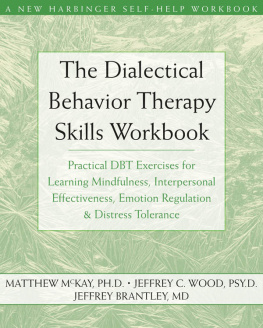
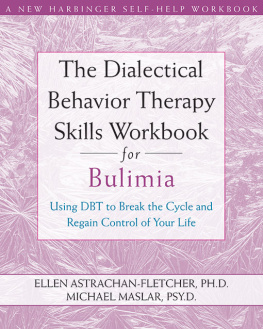
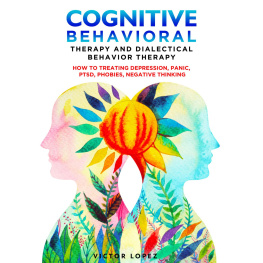
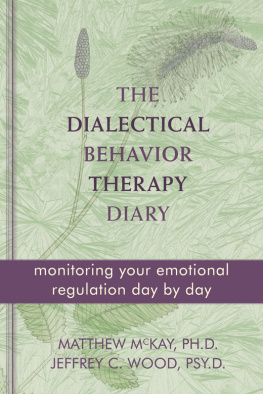
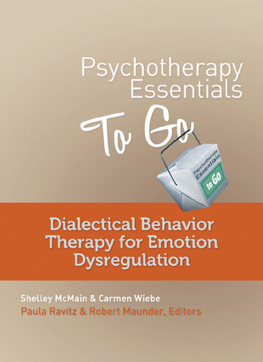
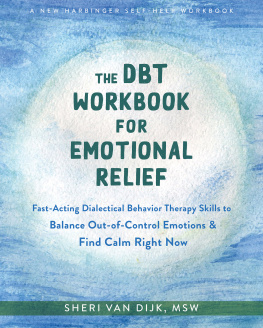
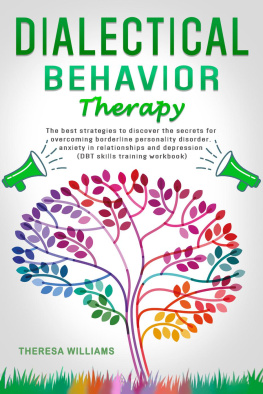
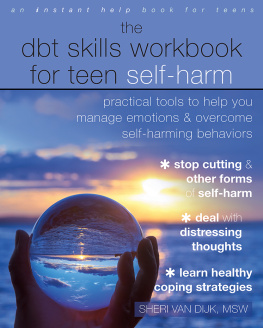
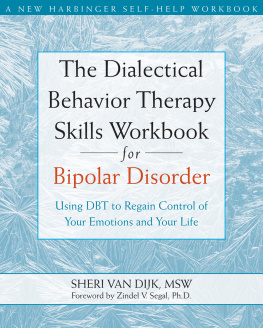
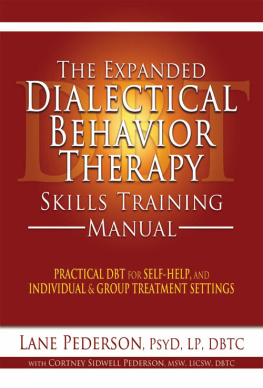
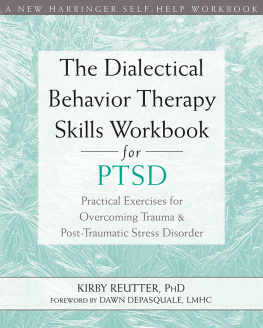

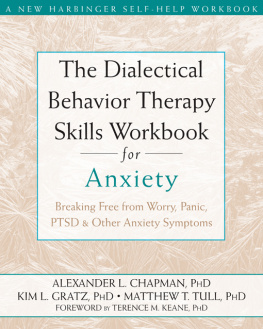
 ) the ones that you use to cope with your stressful situations:
) the ones that you use to cope with your stressful situations:
